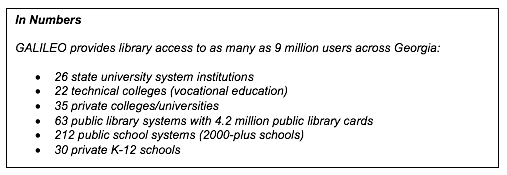Case Study: OpenAthens and GALILEO
Introduction
In January 2018, OpenAthens began working with GALILEO, an initiative of the University System of Georgia, to create a new authentication solution to improve access to resources for Georgia residents. GALILEO was established in 1995 and is one of the largest library consortia in the US, serving around 2,000 educational organizations within the state.
As a customer of EBSCO — a leading resource provider for libraries worldwide — GALILEO facilitates access to core, high-quality instructional and informational electronic resources for a wide range of institutions that include public and private colleges and universities, public K‑12 schools, private K-12 schools, technical colleges, and public libraries.

The organization is unique in serving such a large proportion of the state’s population, as well as providing access to content that is not available elsewhere on the internet. Through the initiative’s own portal, Georgia residents have access to databases, such as the New Georgia Encyclopedia, the Digital Library of Georgia, and Georgia Government Publications.
The GALILEO initiative also works on a number of additional projects beyond portal access to databases that are aimed at fulfilling the organization’s goal of promoting lifelong learning for the residents of Georgia. One of the most notable is the Affordable Learning Georgia initiative that supports the implementation of affordable alternatives to expensive commercial textbooks. The project is saving students millions of dollars on textbooks each semester by facilitating access to open textbooks or to resources made available through GALILEO. Other initiatives include the Georgia Knowledge Repository, which enables Georgia residents and its scholarly community to freely search records from participating GALILEO institutions, and GALILEO Interconnected Libraries, which provides students, faculty and staff with expanded access to the information resources from across the university system’s libraries.
GALILEO’s New Strategic Plan
In 2016, following a phase of staff transition and the installation of a new leadership team, GALILEO began developing an updated strategic plan to focus the organization on the lifelong learning experiences of Georgia’s residents. The two development priorities came out of the feedback gathered as part of the organization’s new strategic plan:
- “Create and maintain user-centered GALILEO environment(s) and interface(s) that are easy to use, customizable, personalized, powerful, and comprehensive in scope.”
- “Make authentication as easy as possible.”
GALILEO began exploring new authentication solutions for accessing the resources provided by EBSCO as a result of major changes in the vendor platform landscape that year. Vendors were moving their platforms to secured sites as a result of updated security requirements, but products were not performing as well as expected, owing to an aging proxy server and back-end infrastructure. It was clear that Georgia residents needed to access resources quickly and easily, and this meant authentication had to be clear and hassle free. The statewide initiative required interfaces that were accessible, designed and customized to meet the needs of GALILEO libraries and the learners they serve.
So, GALILEO started to consider single sign-on (SSO) solutions with Security Assertion Mark-up Language (SAML) authentication as this would not require updating the infrastructure already in place and would enable the customization of its research portals in a way that otherwise wouldn’t be possible.
The Solution
Evaluating the product, OpenAthens could bring several benefits to the library consortia by future-proofing GALILEO authentication and making it more secure, relieving some of the cumbersome tasks of internal staff as a hosted service, providing access to useful data on resources and users, and — the crux — encouraging access to valuable online content by making it quick and easy.
The two organizations started working together in April 2018. Due to the project’s scale and the size of Georgia’s library population, it was immediately clear the project had to be underpinned by a user-centered approach to implementation.
As part of the discovery phase, OpenAthens staff members spent time on the ground in Georgia. OpenAthens organized workshops with various members of the core GALILEO team as well as with representatives from consortia of libraries within the initiative. The team also interviewed end users across the entire spectrum of GALILEO’s partner libraries, including school-aged children and adult public library users. This research was imperative to understanding the library access and resource needs of Georgia residents, and it helped frame the project on the basis of providing a better user experience.
Methodology
After the discovery phase, the OpenAthens team presented a solutions proposal to meet the needs of GALILEO and the complexities of the consortia that form the organization.
Due to the project’s scope, it was evident the OpenAthens product would have to be implemented in an intuitive and agile way. As a result, 18 implementation sites representing the different populations of GALILEO were chosen or volunteered as pilot sites to ascertain the validity of our proposal and to provide an opportunity to stress test the system.
Agnes Scott College was the first GALILEO library to go live with OpenAthens in October 2018, and there are now 12 other live pilot sites. These pilot implementations have enabled OpenAthens and GALILEO to work closely to ensure the best experience possible is delivered to the University System of Georgia’s librarians and users. The pilot phase has enabled a number of improvements to be made to the system as well as changes introduced to the onboarding process to make it as easy as possible for librarians and IT staff to use the product and help users get the most from it.
“GALILEO is committed to making this transition as simple and beneficial to participating libraries and users as possible,” said Russell Palmer, GALILEO assistant director in charge of support systems. “We look forward to providing a better, more useful, nimble, and sustainable GALILEO for all Georgians.”
Continuous Improvement
Now that the pilot phase is approaching completion, EBSCO will take the lead with the full implementation process, having been onboarded by OpenAthens in order to align its services and deliver the resources required by the libraries and learners of the state of Georgia. The team also is continuing to work directly with GALILEO on a number of other projects. As a result of the project’s discovery phase, the two organizations established and maintain a strong relationship.
Knowledge-sharing has been key to understanding consortia-specific challenges as well as identifying requirements and developing agile solutions that benefit the individual institutions. This has enabled OpenAthens and GALILEO to continue making improvements as the project progressed and laid the foundations for their similarly user-centered collaboration.
Having developed and introduced a new access management system, OpenAthens is now working with GALILEO on the redesign of its portal with an eye towards customization to meet the needs of the individual libraries in Georgia and to enable the provision of personalized access to services and resources.
As part of the redesign process, OpenAthens has supported GALILEO in developing 10 in‑depth persona profiles that will be used as a foundation — and guideposts — in the development of the new portal. More than 90 user stories across the various consortia were initially collected. Using these persona profiles, the key requirements of different users across the state of Georgia have been identified and are now guiding the development of user-centered GALILEO interfaces that are personalized, intuitive and comprehensive.
“Customization is a very exciting part of the portal redesign,” Palmer said. “Establishing the attributes of our users using the data we have gathered will help to guide users to the right resources. This will of course entail considerable collaboration and cooperation from our local IT teams but OpenAthens is also supporting our onboarding process.”
OpenAthens is now also working more closely with individual institutions on onboarding and implementation, such as public libraries that require more specific assistance and the development of specific connectors. This work is ongoing to meet requirements of the 2000‑plus libraries in Georgia.
Wayfinder, OpenAthens’ discovery service, is also in the process of being implemented for GALILEO. The service has been developed using agile methods and user-centered design as part of the solution provider’s involvement in the NISO and STM-led RA21 initiative, which aims to resolve some of the fundamental issues associated with accessing online content via federated single sign-on.
Wayfinder enables users to log in by entering their home organization or email address into the search bar. It can either be a hosted service or a component that can be embedded in any publisher or library website.
A user’s search automatically covers all known identity federations a publisher is a member of, without the user needing to be aware of them. This means learners and researchers can log in securely just once to all the multiple online resources that their organizations subscribe to, with their user privacy being preserved.
Looking to the Future
OpenAthens authentication will be operating for most academic institutions by summer 2019, with implementation beginning the following fall for public libraries and the following summer for K-12 schools.
User-centered design has been the main driver guiding the project and working relationship between OpenAthens and GALILEO. It has been used as a larger project management tool and has facilitated a flexible approach to development and implementation with user experience at its core.
The users —librarians, researchers, students, and others — and their needs have been put first, and the project’s access management and portal redesign have been established around them.
OpenAthens’ reporting tools also will prove fundamental in continuing to understand user needs and how they might change over time, providing valuable information about resource usage and user groups across the various institutions that partner with GALILEO.
This transparent approach to implementing an easy-to-use, library-focused authentication solution has enabled GALILEO to begin fulfilling the vision outlined in its strategic plan: to facilitate the creation of knowledge and provide tools and resources to meet the lifelong learning needs of all Georgians.
“The OpenAthens implementation project is key to addressing GALILEO development priorities,” Palmer said. “It is a complex and challenging implementation; however, a library‑focused, easy-to-use, and customizable authentication solution is essential to achieving GALILEO’s vision.”
About OpenAthens
We make it easy for people to access knowledge through single single-on. Our mission is to enable people to achieve great things by connecting them to knowledge and information, whenever and wherever they need it.
We strive to be the world’s most user-friendly single sign-on experience and help more than 2,600 organizations world-wide to provide simple and secure access to online resources for their end users. OpenAthens is a Jisc enterprise.
About GALILEO
GALILEO, Georgia’s virtual library, facilitates the creation of knowledge and provides tools and resources for all Georgians to meet their lifelong learning needs. Located at the juncture of private and public institutions, GALILEO is a statewide, innovative platform integrated into more than 2,800 libraries across the educational spectrum. It supports all Georgians: children, adults, college students, workers, and the general public.

